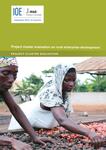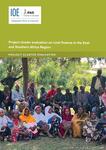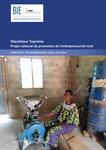Page Header
Project to Improve the Resilience of Agricultural Systems
Overview
The Independent Office of Evaluation has undertaken a project performance evaluation (PPE) of the Project to Improve the Resilience of Agricultural Systems in Chad (PARSAT). The project was implemented between 2015 and 2022. Its objective was to increase the resilience of agricultural systems and rural households to climate change and external shocks, in order to promote the sustainable improvement of the food safety and incomes of rural households in the target area. The PARSAT interventions took place in a fragile context, characterized by, among other things, natural resource degradation, climate risks, scarce agricultural production services, and food insecurity. PARSAT’S results show that an integrated approach can be deployed effectively in a fragile context if the range of activities delivered is simple and realistic. The choice of intervention sites was key: the targeted villages had already benefited from previous IFAD-supported projects, and PARSAT could build upon those results. However, PARSAT also faced important challenges. The actual management costs were significantly higher than initial estimates. Also, PARSAT achieved only modest outcomes in terms of increasing and diversifying the income sources of rural households. The long-term sustainability of the project’s initiatives remains a major challenge. For future interventions in Chad, the PPE recommends, inter alia, to continue multi-thematic projects, especially in the Sahelian and Sudanese zones that have agricultural potential and are relatively safe. Also, projects should consider the structure of the social fabric when identifying intervention entry points, keeping in mind which household and village members are affected by the activities.Report Details
| Year Published | |
| Type | |
| Joint | No |
| Partner/s | N/A |
| Consultant name | |
| Agency Focal Point | Kouessi Maximin Kodjo |
| Focal Point Email | k.kodjo@ifad.org |
| Managed by Independent Evaluation Office | Yes |
| Country/ies |
YOU 'RE READING
Project to Improve the Resilience of Agricultural Systems









